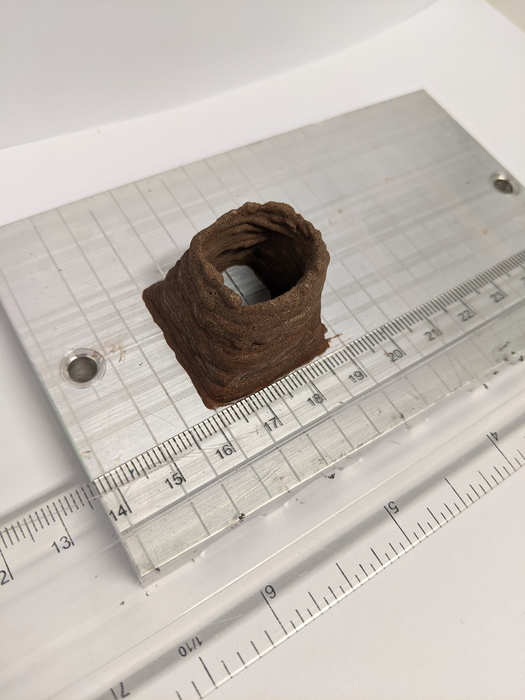More than a million British pounds would be required to transport a single brick to Mars, thus rendering the construction of a Martian colony in the future prohibitively expensive.
 3D-printed Mars biocomposite. Image Credit: The University of Manchester.
3D-printed Mars biocomposite. Image Credit: The University of Manchester.
Recently, researchers from The University of Manchester have devised a method to potentially resolve this problem, by developing a concrete-like material composed of extra-terrestrial dust together with the blood, sweat and tears of astronauts.
According to the research, a protein from human blood, integrated with a compound from sweat, urine or tears, could cement together simulated Mars or moon soil to create a material stronger than regular concrete, ideal for construction work in extra-terrestrial locations. Details of the study have been published in Materials Today Bio.
A single brick transported to Mars would cost approximately US$2 million, which implies that future Martian colonists cannot take building materials with them but will have to use resources they can gather on-site for construction and shelter.
This is referred to as in-situ resource utilization (or ISRU) and essentially concentrates on the utilization of Martian soil (referred to as regolith), loose rock and sparse water deposits. However, there is one unnoticed resource that will also be present on any crewed mission to Mars: the crew themselves.
In the research reported recently in the journal Materials Today Bio, researchers have shown how a common protein from blood plasma, human serum albumin, could serve as a binder for simulated Mars or moon dust to create a concrete-like material. The innovative material has been named AstroCrete and exhibits compressive strengths as high as 25 MPa, which is about the same as the 20–32 MPa compressive strengths exhibited by regular concrete.
However, the team discovered that adding urea — a biological waste product that the body produces and excretes via sweat, urine and tears — could further boost the compressive strength by more than 300%, with the best performing material exhibiting a compressive strength of nearly 40 MPa, considerably stronger than regular concrete.
According to Dr. Aled Roberts from The University of Manchester, who was part of this project, the new method holds significant benefits over many other suggested construction techniques on Mars and the moon.
Scientists have been trying to develop viable technologies to produce concrete-like materials on the surface of Mars, but we never stopped to think that the answer might be inside us all along.
Dr. Aled Roberts, Study Investigator, The University of Manchester
The researchers estimate that more than 500 kg of high-strength AstroCrete could be made within a two-year mission on the surface of Mars by a crew of six astronauts. If employed as a filling for sandbags or heat-fused regolith bricks, each crew member could create sufficient AstroCrete to develop the habitat to provide for an extra crew member, doubling the housing available with subsequent missions.
In the past, animal blood was used as a binder for mortar.
It is exciting that a major challenge of the space age may have found its solution based on inspirations from medieval technology.
Dr. Aled Roberts, Study Investigator, The University of Manchester
The team examined the fundamental bonding mechanism and learned that the blood proteins denature, or “curdle,” to develop a drawn-out structure with interactions called “beta sheets” that firmly hold the material together.
The concept is literally blood-curdling.
Dr. Aled Roberts, Study Investigator, The University of Manchester
Journal Reference:
Roberts, D. A., et al. (2021) Blood, sweat and tears: extraterrestrial regolith biocomposites with in vivo binders. Materials Today Bio. doi.org/10.1016/j.mtbio.2021.100136.
Source: https://www.manchester.ac.uk